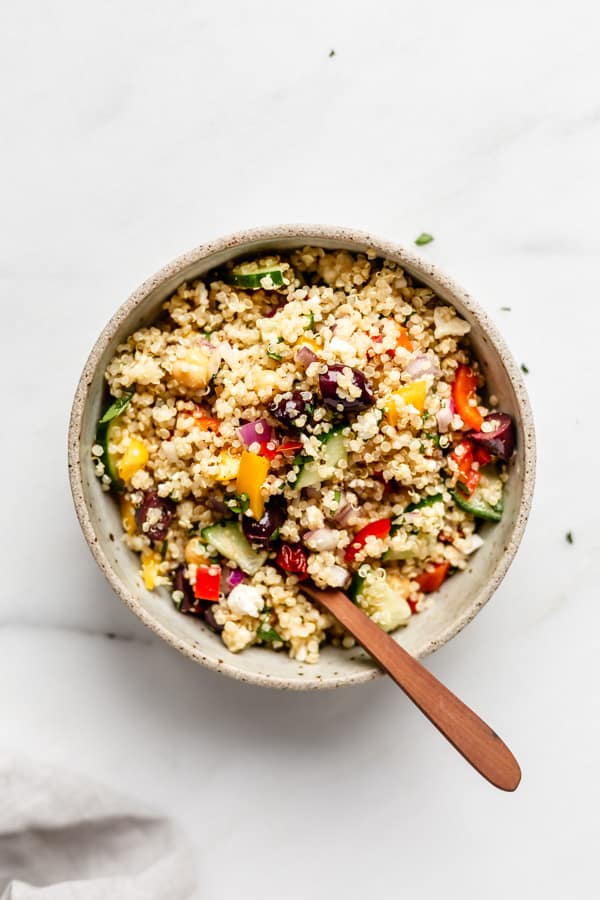The Mediterranean Diet is not just a diet; it's a lifestyle that combines delicious and nutritious foods inspired by the traditional eating patterns of countries bordering the Mediterranean Sea. Renowned for its numerous health benefits, this diet emphasizes fresh, whole foods that promote heart health, weight management, and overall well-being. In this article, we present a weeklong Mediterranean Diet meal plan to help you embark on a journey of nourishment and flavor.
Day 1:
Breakfast: Greek Yogurt with Fresh Berries and Honey
Lunch: Mediterranean Chickpea Salad with Feta Cheese
Dinner: Grilled Mediterranean Salmon with Roasted Vegetables
Day 2:
Breakfast: Whole Grain Toast with Tomato and Avocado
Lunch: Quinoa and Vegetable Stuffed Peppers
Dinner: Lemon Garlic Chicken with Spinach and Couscous
Day 3:
Breakfast: Omelette with Tomatoes, Spinach, and Feta Cheese
Lunch: Greek Salad with Grilled Shrimp
Dinner: Ratatouille with Baked Cod
Day 4:
Breakfast: Oatmeal with Almonds and Fresh Fruit
Lunch: Whole Wheat Pita with Hummus and Veggies
Dinner: Mediterranean Vegetable and Chickpea Stew
Day 5:
Breakfast: Fresh Fruit Smoothie with Greek Yogurt
Lunch: Quinoa Tabbouleh with Grilled Chicken
Dinner: Baked Eggplant Parmesan
Day 6:
Breakfast: Mediterranean Frittata with Sun-Dried Tomatoes and Olives
Lunch: Tuna and White Bean Salad
Dinner: Grilled Swordfish with Lemon and Herbs, Served with Steamed Broccoli
Day 7:
Breakfast: Whole Grain Pancakes with Mixed Berries
Lunch: Caprese Salad with Balsamic Glaze
Dinner: Lentil Soup with a Side of Whole Wheat Bread
Snacks:
Throughout the week, enjoy healthy snacks such as mixed nuts, olives, fresh fruit, and whole-grain crackers with hummus. These snacks will keep you energized and satisfied between meals.
Beverages:
Stay hydrated with water, herbal teas, and the occasional glass of red wine. The Mediterranean Diet encourages moderate consumption of red wine due to its potential heart health benefits.
Tips for Success:
- Embrace Olive Oil: Use extra virgin olive oil as your primary cooking fat and salad dressing. It's rich in heart-healthy monounsaturated fats.
- Load up on Vegetables: Aim to fill half your plate with colorful, non-starchy vegetables for a variety of vitamins, minerals, and antioxidants.
- Choose Whole Grains: Opt for whole grains such as brown rice, quinoa, and whole wheat bread to increase fiber intake.
- Incorporate Seafood: Fish and seafood are excellent sources of omega-3 fatty acids. Aim for at least two servings per week.
- Enjoy Dairy in Moderation: Greek yogurt and feta cheese add a creamy touch to your meals, but consume them in moderation.
Conclusion:
By following this weeklong Mediterranean Diet meal plan, you'll not only nourish your body with wholesome foods but also savor the rich flavors of the Mediterranean. Remember, the key to success is to make these dietary changes sustainable by adopting them as part of a holistic and enjoyable lifestyle. Cheers to good health and delicious meals!
Benefits of the Mediterranean Diet
The Mediterranean Diet has been widely studied and recognized for its numerous health benefits. Here are some key advantages associated with adopting the Mediterranean Diet:
Heart Health:
Reduced Risk of Cardiovascular Disease: The diet is rich in heart-healthy monounsaturated fats from olive oil and omega-3 fatty acids from fish, which contribute to lower levels of LDL (bad) cholesterol and a reduced risk of heart disease.
Weight Management:
Healthy Fats and Fiber: The diet emphasizes whole grains, fruits, vegetables, and healthy fats, promoting satiety and aiding in weight management.
Improved Cognitive Function:
Brain Health: The abundance of antioxidants and omega-3 fatty acids in the diet may contribute to a lower risk of cognitive decline and neurodegenerative diseases.
Cancer Prevention:
Antioxidant-rich Foods: Fruits, vegetables, and olive oil are packed with antioxidants, which may help reduce the risk of certain cancers.
Diabetes Management:
Stabilized Blood Sugar Levels: The Mediterranean Diet's emphasis on whole grains, legumes, and fiber helps regulate blood sugar levels, making it beneficial for individuals with or at risk of type 2 diabetes.
Anti-Inflammatory Properties:
Rich in Anti-Inflammatory Foods: The diet includes foods such as fatty fish, olive oil, nuts, and fruits, which have anti-inflammatory properties that may help reduce inflammation in the body.
Digestive Health:
Fiber-Rich Foods: The diet is high in fiber from fruits, vegetables, and whole grains, promoting a healthy digestive system and reducing the risk of constipation.
Longevity:
Increased Life Expectancy: Studies have suggested that adherence to the Mediterranean Diet is associated with a longer life expectancy and a reduced risk of premature death.
Improved Blood Pressure:
Lower Blood Pressure: The combination of potassium-rich foods (such as fruits and vegetables) and the use of olive oil has been linked to lower blood pressure levels.
Better Lipid Profiles:
Improved Cholesterol Levels: The diet's emphasis on healthy fats and a variety of nutrient-dense foods contributes to improved lipid profiles, with higher levels of HDL (good) cholesterol.
Joint Health:
Anti-Inflammatory Effects: Certain foods in the diet, such as fatty fish and olive oil, may help reduce inflammation, benefiting individuals with conditions like arthritis.
Balanced Nutrition:
Rich in Nutrients: The diet provides a balanced and diverse range of nutrients, including vitamins, minerals, and antioxidants, contributing to overall health and well-being.
It's important to note that the Mediterranean Diet is not just about individual foods but also about the overall pattern of eating. Combining a variety of nutrient-dense foods and enjoying meals in a social and relaxed setting are integral aspects of this lifestyle, contributing to both physical and mental well-being.
Recipes for Mediterranean Diet
1. Mediterranean Quinoa Salad:
Ingredients:
- 1 cup quinoa, rinsed
- 2 cups cherry tomatoes, halved
- 1 cucumber, diced
- 1 red bell pepper, diced
- 1/2 red onion, finely chopped
- 1/2 cup Kalamata olives, sliced
- 1/2 cup crumbled feta cheese
- 1/4 cup fresh parsley, chopped
For the Dressing:
- 1/4 cup extra-virgin olive oil
- 2 tablespoons red wine vinegar
- 1 teaspoon dried oregano
- Salt and pepper to taste
Instructions:
Cook quinoa according to package instructions. Let it cool.
In a large bowl, combine quinoa, tomatoes, cucumber, bell pepper, red onion, olives, feta, and parsley.
In a small bowl, whisk together the dressing ingredients.
Pour the dressing over the salad and toss gently to combine.
Chill in the refrigerator for at least 30 minutes before serving.
2. Mediterranean Baked Salmon:
Ingredients:
- 4 salmon fillets
- 2 tablespoons extra-virgin olive oil
- 3 cloves garlic, minced
- 1 teaspoon dried oregano
- 1 teaspoon dried thyme
- 1 lemon, sliced
- Salt and pepper to taste
- Fresh parsley for garnish
Instructions:
Preheat the oven to 375°F (190°C).
Place salmon fillets on a baking sheet lined with parchment paper.
In a small bowl, mix olive oil, minced garlic, oregano, thyme, salt, and pepper.
Brush the salmon fillets with the olive oil mixture.
Top each fillet with lemon slices.
Bake for 15-20 minutes or until the salmon flakes easily with a fork.
Garnish with fresh parsley before serving.
3. Greek Chicken Souvlaki:
Ingredients:
- 1.5 lbs boneless, skinless chicken breasts, cut into cubes
- 1/4 cup extra-virgin olive oil
- 3 cloves garlic, minced
- 1 teaspoon dried oregano
- 1 teaspoon dried rosemary
- Juice of 1 lemon
- Salt and pepper to taste
- Tzatziki sauce for serving
Instructions:
In a bowl, mix olive oil, minced garlic, oregano, rosemary, lemon juice, salt, and pepper.
Add chicken cubes to the marinade, ensuring they are well-coated. Marinate for at least 30 minutes.
Preheat a grill or grill pan over medium-high heat.
Thread marinated chicken onto skewers.
Grill the chicken skewers for about 6-8 minutes per side or until fully cooked.
Serve with a side of tzatziki sauce.
Feel free to customize these recipes based on your preferences and dietary needs. These dishes are not only delicious but also showcase the vibrant flavors and healthful ingredients characteristic of the Mediterranean Diet.
How to start the Mediterranean Diet
Embarking on the Mediterranean Diet can be a positive and enjoyable journey toward better health. Here's a step-by-step guide on how to start the Mediterranean Diet:
1. Educate Yourself:
Understand the Basics: Learn about the key principles of the Mediterranean Diet. Familiarize yourself with the types of foods that are encouraged and those that are limited.
2. Stock Your Pantry:
- Healthy Fats: Invest in extra-virgin olive oil, which will be a staple in your cooking.
- Whole Grains: Opt for whole grains such as brown rice, quinoa, and whole wheat pasta.
- Legumes: Keep a variety of beans, lentils, and chickpeas on hand.
- Nuts and Seeds: Choose unsalted nuts and seeds for snacking or adding to dishes.
- Herbs and Spices: Build a collection of herbs and spices like oregano, basil, thyme, and rosemary for flavor without excessive salt.
3. Prioritize Fresh Produce:
Fruits and Vegetables: Fill your refrigerator with a colorful array of fruits and vegetables. These should form the basis of your meals.
4. Incorporate Lean Proteins:
Fish and Seafood: Aim to include fatty fish (like salmon and mackerel) at least twice a week. Other seafood and lean meats can be consumed in moderation.
Plant-based Proteins: Incorporate legumes, beans, and tofu as alternative protein sources.
5. Choose Dairy Wisely:
Greek Yogurt and Cheese: Opt for Greek yogurt and feta cheese in moderation. These provide a good source of protein and calcium.
6. Enjoy Moderate Amounts of Poultry and Eggs:
Chicken and Eggs: Include moderate portions of poultry and eggs in your diet.
7. Limit Red Meat and Processed Foods:
Red Meat: Consume red meat sparingly. When you do, choose lean cuts and limit processed meats.
Processed Foods: Minimize the intake of processed and refined foods.
8. Practice Mindful Eating:
Sit Down for Meals: Avoid eating on the go. Sit down and savor your meals in a relaxed environment.
Listen to Your Body: Pay attention to hunger and fullness cues.
9. Moderate Alcohol Consumption:
Red Wine: If you drink alcohol, enjoy a glass of red wine in moderation. This is a common practice in the Mediterranean lifestyle.
10. Stay Hydrated:
Water: Drink plenty of water throughout the day. Herbal teas are also a good choice.
11. Cook at Home:
Prepare Your Own Meals: Cooking at home allows you to have better control over the ingredients and cooking methods.
12. Socialize and Enjoy Meals:
Shared Meals: Embrace the Mediterranean tradition of sharing meals with family and friends. Meals are not just about sustenance but also about socializing and enjoying good company.
13. Gradual Changes:
Start Slow: Make gradual changes to your eating habits. Implementing small adjustments over time can lead to long-term success.
14. Seek Professional Guidance:
Consult a Nutritionist: If you have specific dietary concerns or health conditions, consider consulting a nutritionist or healthcare professional for personalized advice.
Remember, the Mediterranean Diet is not a strict set of rules but a flexible and enjoyable lifestyle. It's about making sustainable choices that align with the core principles of the diet. Listen to your body, experiment with recipes, and embrace the variety of delicious and nutritious foods that this eating pattern has to offer.


Comments
Post a Comment